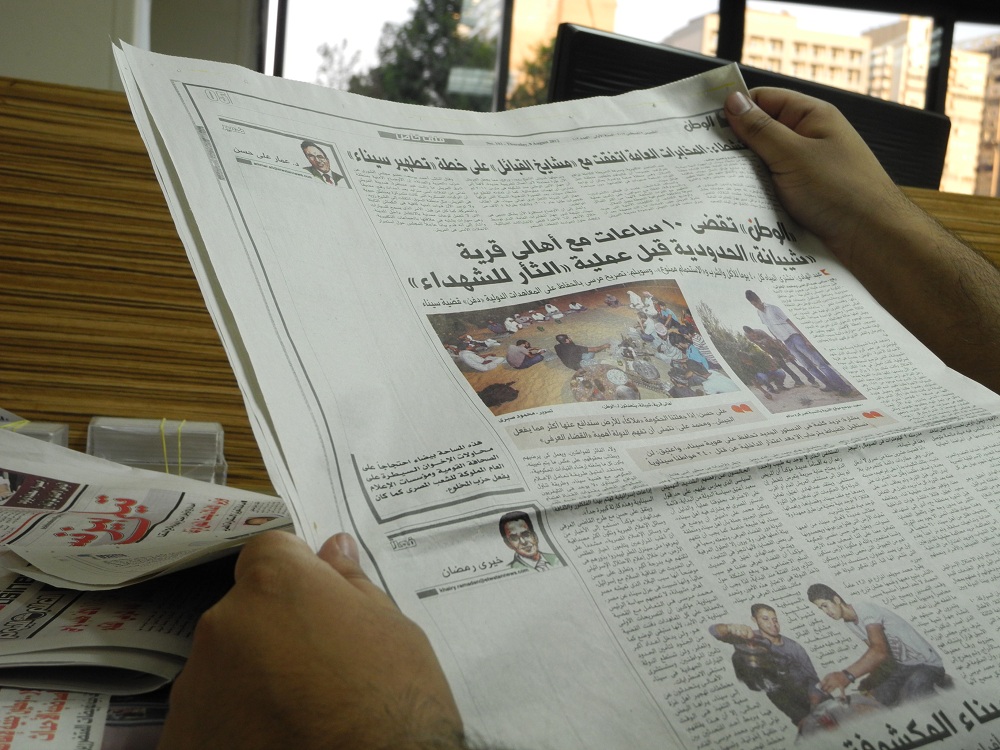The Ministry of Foreign Affairs has continued a reactionary policy towards negative foreign coverage by launching two new English services in August with the attempt of putting across a “more objective” account of events in the country, it has said.
A spokesperson has also confirmed to Daily News Egypt changes within the Ministry’s ‘human rights unit’.
In the second week of August, the Ministry launched an English-language Facebook page to publish the activities of the ministry and the country in a language with more international spread than its previous solely-Arabic service. It also launched an English-language blog, which aims to address international coverage, which is frequently more critical than the supportive and muzzled local press.
The Facebook page has been used so far to cover routine ministry affairs and also to direct criticism at bodies that it sees as providing bias or inaccurate coverage of Egypt’s affairs.
On the second anniversary of the violent dispersals of Muslim Brotherhood sit-ins at Rabaa Al-Adaweya and Al-Nahda Square, the ministry used the page to rubbish a press release by Human Rights Watch (HRW) in which the prominent NGO reiterated calls for an investigation into the events of August 2013 on the basis of “probable crimes against humanity”.
Ministry spokesperson Ahmed Abu Zeid expressed his “absolute rejection of such a politicised and un-objective report”. He added that the report lacked “any semblance of credibility or impartiality, and was issued by an entity with no jurisdiction”, and said HRW gives “no heed” to those who die by “the brutality of terrorism in Egypt every day”.
The launch of the Facebook page arrived as President Abdel Fattah Al-Sisi ratified a new counter terrorism law mid-August which, among other elements, making it illegal for media in Egypt to use numbers different to those issued by the government on counter-terrorism operations and attacks. The charge carries a minimum fine of EGP 200,000.
Similarly, another spokesperson for the Ministry of Foreign Affairs told Daily News Egypt on Tuesday that reports of the ministry establishing a new human rights unit are inaccurate. He said: “There already was a human rights section but now we are expanding it; it has not been officially announced yet but it should begin working soon.” However, the spokesperson could not comment on what the unit will be tasked with.
The ministry’s Facebook page has also been used to target a CNN report about the political and security situation in Egypt, describing it as “unprofessional” and “lacking objectivity”. The report, published after the apparent beheading of a Croatian citizen by Egyptian militants, noted that Egypt was facing severe militant and economic difficulties and is struggling to tackle the “Islamic State”-affiliated “State of Sinai” group that appears to be growing in strength in the north of the peninsula. The report also suggests that Egypt’s regional power in the Middle East has declined.
“This report lacks the minimal degrees of objectivity and neutrality where it includes misinformation,” said Abu Zeid in a statement. “The areas witnessing terrorist attacks in Sinai represent only 5% of the total Sinai Peninsula, which is totally secure.”
A week after the Facebook page launch, the ministry has also launched a blog “to ensure greater interaction with the wider public”. The site has gone live with an opening piece by Sameh Shoukry, in which he says that it will be used to “provide a more objective narrative of events in Egypt for those who seek more than just the partial truth”, in apparent reference to English-language coverage of Egypt.
He says that partly the initiative is because Egypt is at a disadvantage, in which “developing countries, including Egypt, are still struggling to pierce the almost impenetrable world of global corporate media”.
An initial blog piece on the site confronts the negative international coverage of the New Suez Canal, inaugurated earlier in the month. The writer, understood to be an employee of the foreign ministry, suggests that the doubts about the Suez Canal’s economic potential are misguided as “no man-made project in the world can guarantee the undivided support of all experts and thinkers”.
The writer maintains that, as the world’s economy grows, so will the canal’s revenues, and the projections of revenues more than doubling in eight years do not need to be met for it to be a successful project.
The writer also suggests that a sarcastic Foreign Policy piece on the canal by commentator Sarah Carr was “one of the most disturbing analyses” as it failed to engage in economic analysis and derided the joy of Egyptians on the day of the inauguration in a “racist! manner.
The blog quotes Carr as commenting how “Egyptian flags sprouted everywhere like a nationalist fungus” on the day, and says that Carr’s writing had an “air of moral and cultural superiority”.


